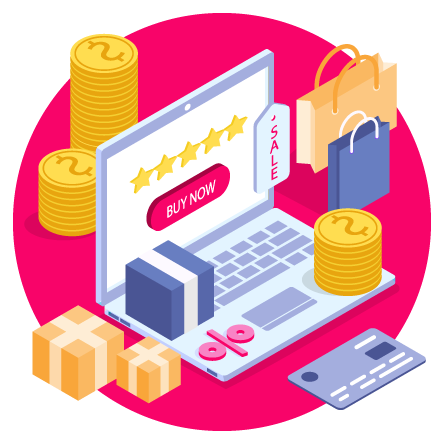
14th December 2022

When it comes to setting up an online e-commerce store , there are a few different e-commerce platforms to choose from. Two of the most popular ones are WooCommerce and Shopify.
WooCommerce is a WordPress plugin that turns your WordPress website into an online store. It’s free to use and is one of the most popular e-commerce platforms in the world.
Shopify, on the other hand, is a paid platform with monthly fees. It’s designed specifically for e-commerce businesses and has all the tools and features you need to run a successful online store.
So, which one is right for you? In this blog post, we’ll compare WooCommerce vs Shopify to help you make the best decision for your business.
WooCommerce is a plugin, built for WordPress, that turns your website into an online store.

Unlike competing e-commerce integrations, WooCommerce is completely free to use. Simply download the plugin and get started. There are no licensing fees or limits on the number of WordPress websites you can use WooCommerce with.
WooCommerce is also open-source software. That means anyone can contribute to its development (which we’ll talk more about later). This also means it’s constantly evolving and becoming more powerful.
The plugin was first launched in 2011 and has since become the second most popular e-commerce platform in the world.
WooCommerce is a great platform for small businesses and entrepreneurs.
But like anything, there are some pros and cons to be aware of. We’ll break those down below.

One of the biggest benefits of using the WooCommerce platform is that it’s free to use. That’s right, you can set up a beautiful online store without spending a dime.
Of course, there are outside costs associated with running a WooCommerce store (such as hosting fees, shipping, and transaction fees), but this is still a huge benefit for small businesses and entrepreneurs who are just getting started.
WooCommerce is a completely open-source platform, which means that anyone can access and alter the code.
If you’re a programmer or designer you can customize the platform to fit your specific needs.
If you aren’t familiar with coding, don’t sweat it. There is a large community of developers and designers who are always creating new themes and plugins for WooCommerce.
WooCommerce is an incredibly flexible platform that can be customized to fit the needs of almost any type of online store.
There are literally thousands of plugins and themes available for WooCommerce, which allow you to add any features or design elements that you can imagine to your WooCommerce shop.
Plus, each of these features can be easily configured to match the design and aesthetic of your online shop, making it easy to create a completely unique and branded experience for your customers.
Another great WooCommerce benefit is that it is a very secure platform.
WooCommerce is regularly updated to keep up with the latest cybersecurity threats, and there are plenty of plugins available to add even more security features to your WooCommerce shop.
It also offers secure gateways and e-wallets for payment processing, through Stripe, PayPal, WePay, and Payza.
Because WooCommerce is so customizable, it can be a little tricky to set up and manage if you don’t have any technical knowledge.
If you’re not familiar with things like hosting, domain names, and SSL certificates, you may need to hire someone to help you set up and manage your WooCommerce shop.
WooCommerce is a free plugin you can use with a WordPress site . However, you will need to pay for things like hosting, a domain name, and an SSL certificate if you want to add them to your WooCommerce shop.
You will also need to pay for any extensions or plugins that you want to add to your WooCommerce shop.
If you’re not careful, these costs can add up over time.
One of the biggest downfalls of the WooCommerce platform is its reliance on plugins. While plugins are great for adding features and functionality to your WooCommerce shop, they can also hurt performance.
This is because each plugin that you add to your WooCommerce shop will need to be loaded every time a page is loaded.
And if you have a lot of plugins, this can really slow down your WooCommerce shop.
So if you’re looking for an e-commerce platform that is fast and lightweight, you may want to look elsewhere.
Remember, WooCommerce does not stand alone; it is a plugin for WordPress .
This means that you can only use WooCommerce if you’re using WordPress to host your website.
If you’re not using WordPress, then WooCommerce is not an option for you.
Additionally, this also means that WooCommerce is subject to all of the same limitations as WordPress.
For example, if WordPress goes down, so does your WooCommerce shop.
Shopify is an online software as a service (SaaS) platform that allows you to build a custom online store.
Merchants who use Shopify have the ability to sell in multiple places, including web, mobile, social media, online marketplaces, brick-and-mortar locations, and pop-up shops.

Shopify is a subscription-based platform with different tiers that offer different features.
The Basic Shopify plan starts at $29 per month, while the Advanced Shopify plan starts at $299 per month.
The platform is completely cloud-based and hosted, meaning you can access it from a connected device anywhere in the world.
Shopify is a powerful e-commerce platform with plenty of features to build and grow your online store.
However, like any other platform, it has its own set of pros and cons that you should consider before making a final decision.

Let’s take a closer look below.
One of the main advantages of Shopify is its ease of use.
The platform makes it easy to set up and manage your store, even if you don’t have any technical experience.
Shopify offers a simple, clear interface, and comes with plenty of helpful tutorials and guides to get you started.
Shopify is known for its professional themes.
These themes make it easy to create a beautiful, modern store that looks like it was designed by a professional.
With Shopify, you can choose from a wide range of industry-specific themes, or you can use one of the platform’s free or paid themes.
No matter what you choose, your store will look great on all devices, including mobile.
Shopify offers 24/7 support to all its users. Whether you need help with choosing a theme, setting up your store, or anything else, Shopify’s support team is always there to help.
You can contact them via live chat, email, or phone.
They also have a huge knowledge base and a community forum where you can find answers to most of your questions.
Shopify hosts an impressive in-house app store with more than 1,200 plugins and apps for your site.
Some of the apps available in the Shopify App Store will automate and streamline the processes of your business, leaving you with more time to focus on the important stuff.
If you’re not familiar with accounting, inventory management, or shipping, there are apps that can help take care of those things for you.
With such a large selection, you’re sure to find everything you need to power your store.
While Shopify is a great platform for starting an online store, it does have some limitations in terms of functionality.
For example, Shopify doesn’t offer certain features that are available on other platforms, such as the ability to create a custom checkout process.
Shopify is not free to use. There is a monthly subscription cost, and you also have to pay for some themes and apps.
In addition, there is a transaction fee when you sell online unless you use Shopify Payments. The only free plan available is their free trial.
While Shopify does offer a wide range of themes and apps to customize your store, there are limits to what you can do with the platform.
If you’re looking for a highly custom e-commerce solution, Shopify may not be the right platform for you.
Similar to WooCommerce, Shopify lacks many features out of the box.
However, where WooCommerce offers plugins to add functionality, Shopify relies on apps from its app store.
While this gives you more flexibility in the long run, it can also be costly.
If you’re looking for a platform that has everything you need without having to pay for additional apps, Shopify may not be the right choice.
Now that you understand some of the pitfalls and benefits of each platform, let’s do a quick recap of WooCommerce vs. Shopify.

Well, our official recommendation is this: If you’re new to e-commerce, or if you don’t have the time or resources to manage a self-hosted platform, then Shopify is the way to go.
If you’re an experienced developer or store owner, and you’re comfortable managing your own website, then WooCommerce might be a better fit.
Of course, there are exceptions to every rule.
For example, if you’re selling digital products, then WooCommerce might be a better option because of its built-in support for downloadable products.
Or, if you’re looking for a more hands-off approach to eCommerce, then Shopify might be the platform for you.
No matter which platform you choose, you’ll be able to create a beautiful and functional online store that attracts repeat customers .
Shopify Plus is the enterprise version of Shopify, and it’s designed for high-growth businesses.
Similar to WooCommerce, Shopify Plus offers a customizable platform with a wide range of features that can handle the tough demands of enterprise businesses.

For example, if you need to process large amounts of orders, Shopify Plus will streamline your process.
If you need to offer custom pricing or product bundles, Shopify Plus can do that too.
Shopify Plus offers:
If you’re looking for an eCommerce platform that can scale with your business, Shopify Plus is a great option. However, it’s important to note that Shopify Plus is more expensive than WooCommerce, though it does come with some added benefits.
Every Shopify Plus account comes with a dedicated Account Manager who will help you with things like store setup, theme customization, and app recommendations.
Shopify Plus also offers lower transaction fees than WooCommerce (just 0.15% compared to WooCommerce’s standard rate of 0.30%).
If you’re an enterprise business or high-growth startup, Shopify Plus is definitely worth considering. However, if you’re just starting out or on a tight budget, WooCommerce may be a better option for you.
Head to head: The FAQs!
What are the most common Shopify vs WooCommerce questions?

Ready to start your e-commerce journey?

If you’re looking to build an e-commerce website in the UK, we can help.
ALT Agency has been building high-performing websites for more than 18 years.
We pride ourselves on creating beautiful, responsive websites that are optimised for search engines and easy to use. Contact us today to get started.
Our team of experts will work with you to create a WooCommerce or Shopify site that’s optimised for conversions and easy to use. Get in touch today to find out more.
Image credits:
designed by Freepik – Freepik.com
designed by Pikisuperstar – Freepik.com
Director of ALT Agency with a passion for all things design & conversion driven. Love Formula 1, Business and Property Investing.
Now we’d like to hear yours:
Do you have a big idea that you want to bring to the market quickly via a beautiful and user-friendly website? Whether you have the details of a project ready to go or need help finishing an existing project or even starting one from scratch, our team will help you achieve the results you need to make your business profitable.
Get In Touch Today